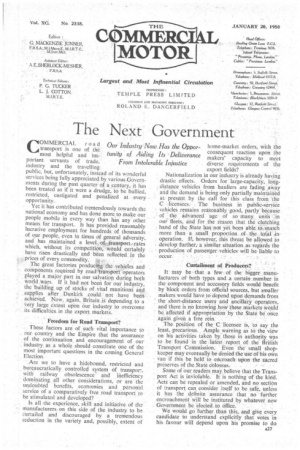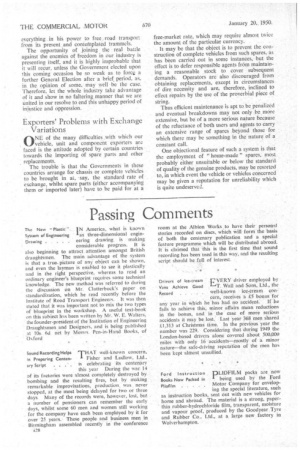The Next Government
Page 29

Page 30

If you've noticed an error in this article please click here to report it so we can fix it.
COM MERCIAL road Our Industry Now Has the Opportransport is one of the most helpful and lin_ !unity of Aiding Its Deliverance portant servants of trade. From Intolerable Injustice industry and the travelling public, but, unfortunately, instead of its wonderful services being fully appreciated by various-Governments during the past quarter of a century, it has been treated as if it were a drudge, to be bullied, restricted, castigated and penalized at every opportunity.
• Yet it has contributed tremendously towards the national economy and has done more to make our people mobile in every way than has any other means for transport. It has provided reasonably lucrative employment for hundreds of thousands of our people, even in times of general adversity, and has maintained a level ,-off.jransport,rates which, without its competition, Would certainly have risen drastically and been reflected in the , -prices of every commodity. ' The great factories producing the vehicles and components required by road transport operators • played a major part in, our salvation during both world Nars. If it had not been for our industry, the 'building up of stocks of vital munitions and supplies after Dunkirk could not '-have been achieved. Now, again, Britain is depending to a irery large extent upon our industry to overcome its difficulties in the export markets.
Freedom for Road Transport?
These factors are of such vital importance to , our country and the Empire that the assurance of the continuation and encouragement of our industry, as a whole _should constitute one of the most important questions in the coming General Election Are we to have a hidebound, restricted and bureaucratically controlled system of transpor, with railway obsolescence and inefficiency dominating all other considerations, or are the undoubted benefits, economies and personal service of a comparatively free road transport to be stimulated and developed?
Is all the experience, skill and initiative of the manufacturers on this side of the industry to be curtailed and discouraged by a tremendous reduction in the variety and, possibly, extent of home-market orders, with the consequent reaction upon the makers' capacity to meet diverse requirements of the export fields?
Nationalization in our industry is already having drastic effects. Orders for large-capacity, long: distance vehicles from hauliers are fading away and the demand is being only partially Maintained at present by the call for this class from the C licensees. . The business in public-service vehicles remains reasonably good, partly because of " the advanced age of so many., units in our fleets, and for the reason that the clutching . hand of the State has not yet been able to snatch more than a small proportion of. the,. total.,in : operation. however, this threat be allowed to ; deVelop further; a similar situation -as regards the production of passenger vehicles will be liable to occur. Curtailment of Producers?
it may be that a few of the bigger-manufacturers of both types and a certain number, in the component and accessory fields would benefit by block orders from official sources, but smaller makers would have to depend upon demands from the short distance users and ancillary operators, and there is no knowing how these markets would be -affected if appropriation by the State be Once again given a free rein.
The position of the Clicensee is to say the least, precarious Ample warning as to the view on his activities taken by those in authority Was to be found in the latest report of the British Transport Commission. Even the small shopkeeper may eventually be denied the use of his own van if this be held• to encroach upon the sacred preserves of the State colossus, Some of our readers may believe that the Transport Act is inviolable. It is nothing of the kind. Acts can be repealed or amended, and no section of transport can consider itself to be safe, unless it has the definite assurance that no further encroachment will be instituted by whatever new Government be elected to office.
We would go further than this and give every candidate to understand explicitly that votes in his favour will depend upon his promise to do A27 everything in his .power to free road transport from its present and contefnplated trammels.
The opportunity of joining the real battle against the enemies of freedom in our industry is presenting itself, and it is highly improbable that it will recur, unless the Government elected upon this coming occasion be so .weak as to force a further General Election after a brief period, as, in the opinion of some, may well be the case. Therefore, let the whole industry take advantage of it and show in no faltering manner that we are United in our resolve to end this unhappy period of injustice and oppression.
Exporters' Problems with Exchange Variations
ONE of the many difficulties with which our vehicle, unit and component exporters are faced is the attitude adopted by certain countries towards the importing of spare parts and other replacements.
The trouble is that the Governments in these countries arrange for chassis or complete vehicles to be brought in at, • say, the standard rate of exchange, whilst spare parts (either accompanying them or imported later) have to be paid for at a free-market rate, which may require almost twice the amount of the particular currency.
It may be that the object is to prevent the construction of complete vehicles from such spares, as has been carried out in some instances, but the effect is to defer responsible agents from maintaining a reasonable stock to cover subsequent demands. Operators are also discouraged from obtaining replacements, except in circumstances of dire necessity and are, therefore, inclined to effect repairs by the use of the proverbial piece of string.
Thus efficient maintenance is apt to be penalized and eventual breakdowns may not only be more extensive, but be of a more serious nature because of the reluctance of both users and agents to carry an extensive range of spares beyond those for which there may be something in the nature of a constant call.
One objectional feature of such a system is that the employment of " home-made " spares, most probably either unsuitable or below the standard of quality of the genuine products, may be resorted to, in which event the vehicle or vehicles concerned may be given a reputation for unreliability which is quite undeserved..




















































































